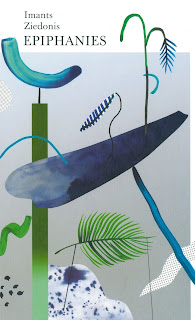Līga Horgana is back with a literature review of Epiphanies written by Imants Ziedonis and translated by Bititie Vinklers and Ivars Šteibergs.
Having become interested in Imants Ziedonis’ (1933-2013) work after reading my previous review about The Colourful Tales, my husband came home recently with another of the poet’s works he had found in our local bookstore. The thin, less than a hundred page book published by Jumava in 2019 contains 39 selections from the most quintessential part of Ziedonis’ work – his three collections of Epiphanies originally published in 1971, 1974 and 1994. This one volume collection uses translations by Bititie Vinklers and Ivars Šteinbergs.
What exactly is an “epiphany”? In the foreword to Ziedonis’ first collection that came out in 1971, the author explained that “epiphany is a Greek word — reflection and revelation. Epiphanies are still a little-mentioned genre in the history of literature, they are small impulses, little flashes, in whose light different moments from life seem particularly vivid.” However, they have also been called his “Prose Poems.” Vinklers explains that Ziedonis’ epiphanies “utilize all the poetic elements of poetry, except the basic formal unit is the sentence rather than the line”. (17.p.)
Personal opinions and inner independence, man and nature, society and its rules, freedom and the limits, time and death – these are just a few motives that appear in Ziedonis’ epiphanies. Here is a short passage of a work from the epiphany “All of Us are Bottles and Jars” from the original 1971 collection:
“All of us are bottles and jars, boxes an billboards. We are, and always will be, passed over. It’s the social norm. Because a label is a form of identification: You wear a wide gabardine coat – you are your own person; you have tattoos on your arms and chest – you are one of us; you play the guitar and have long hair – you’re one of the guys. You are a gentleman, you are a fop, you are a snob, and you are a citizen. Some can be recognized by their imported clothes, by their fashionable sunglasses, hats, sweaters, or suspenders. Others wear expensive, unobtainable fur hats.
But there comes a time when you scrape it all off, to be as clean again as you were at the beginning.” (38.p.)
Baņuta Rubess, a Canadian Latvian writer and theater director, has described Ziedonis as a “phenomenon” in Latvian literature, read by everyone: “fishermen and milkmaids, beekeepers and hairdressers, actors and presidents.” (9.p.) I still remember certain lines and thoughts from the collections from when I first had to read them in high school literature class, especially the epiphany “Walk Around It” — the idea of respecting others by giving them their physical and spiritual personal space has always stuck with me, and it is still probably my favorite. However, reading these epiphanies again, I have particularly noticed how much Ziedonis’ interest in Latvian folklore and our connection to nature shows through — walking in the countryside among haystacks, smelling pine sap and raindrops, listening to flowers “speak” and bees “radiate”, and feeling thunder “walking around” before a storm. Like many other Latvians, I enjoy having the collections of Epiphanies at home and reading Ziedonis’ impulsive flashes of wisdom from time to time.
If you want to have a deeper understanding of Latvian literature and culture, this English collection is an excellent read. For those who understand Latvian, you also can hear Ziedonis himself reading some of his epiphanies in the original language here.
Make sure to press "subscribe" at the top of the page to know when every new literature review and other great articles about Latvia will be released, and like us on Facebook for important stories of the day each evening!

Comments
Post a Comment